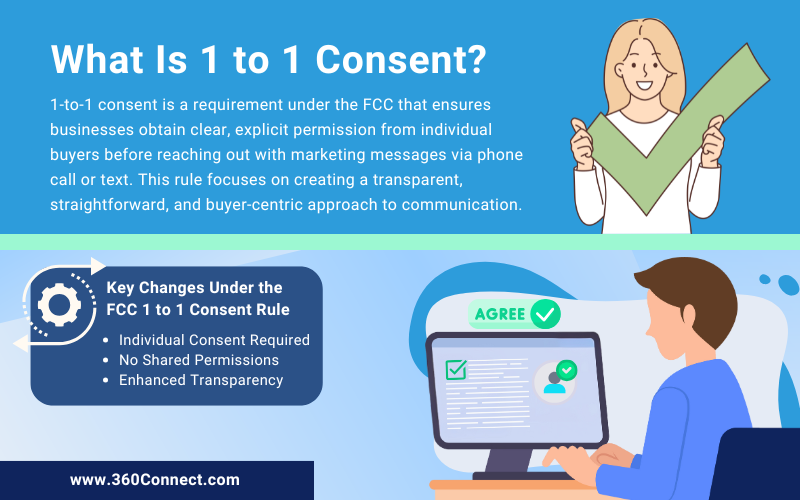Update (January 2025): The FCC has postponed the effective date of the 1-to-1 consent rule. Read the latest update here.
The marketing world is evolving, which means businesses need to keep up with new standards. Enter 1-to-1 consent—a game-changing FCC requirement that redefines how suppliers connect with buyers.
So, what is 1 to 1 consent and how will this impact suppliers and lead generation? That’s what we’re here to answer. Essentially, the new rule prioritizes transparency and trust. It’s designed to eliminate ambiguity and foster meaningful connections. This rule ensures buyers give clear and explicit permission to be called or texted.
In this blog, we’ll explore what 1-to-1 consent means, the key changes under the FCC rule, and how suppliers can embrace this shift to strengthen their marketing and sales efforts. Whether you’re navigating this update for the first time, trying to understand exactly what it is, or seeking actionable tips, we’ve got you covered. Let’s dive in!
Key Takeaways
- What is 1-to-1 Consent? Businesses need clear permission from buyers before reaching out via phone call or text, creating trust and transparency.
- Why It Matters: This rule helps suppliers connect with buyers who are truly interested in their products or services.
- The Opportunity: By following this rule, businesses can build stronger relationships and stand out as trustworthy.
What Is 1 to 1 Consent?
1-to-1 consent is a new requirement under the FCC that ensures businesses obtain clear, explicit permission from individual buyers before reaching out with marketing messages via phone call or text (this includes voicemails, automation, and AI software). The rule focuses on creating a transparent, straightforward, and buyer-centric approach to communication. It empowers buyers to decide who they hear from and eliminates any ambiguity about consent, making marketing interactions more meaningful and aligned with their preferences.

Key Changes Under the FCC 1 to 1 Consent Rule
The FCC’s new 1-to-1 consent rule is designed to create a more transparent and controlled process for buyer-supplier communication. Basically, the rule aims to give buyers greater control over who can contact them, while ensuring suppliers adhere to clear, compliant practices. These updates represent a significant shift toward trust-based, permission-driven interactions.
Here are the three key changes established by the FCC:

1. Individual Consent
Businesses must now obtain consent for each specific call or text, ensuring buyers are only contacted by the companies they have explicitly approved.

2. No Shared Permissions
Consent provided to one company can no longer be shared with partners or affiliates.

3. Enhanced Transparency
Clear and concise communication about consent is required, ensuring buyers know exactly what they’re signing up for.
How Does 1 to 1 Consent Impact Lead Generation?
1-to-1 consent shifts the focus from quantity to quality in lead generation. For instance, by targeting only those who have explicitly expressed interest, businesses can nurture stronger relationships and engage with leads who are genuinely interested in their offerings. Thus, it encourages companies to prioritize personalized, value-driven messaging, resulting in higher engagement and better outcomes.
- Improved Lead Quality: Engaging with buyers who have explicitly opted in ensures you’re connecting with prospects genuinely interested in your solutions.
- Streamlined Outreach: Clear consent allows suppliers to focus on marketing to a highly targeted audience.
- Stronger Buyer-Supplier Relationships: Focusing on consent-based communication fosters trust and creates a solid foundation for long-term partnerships.
What Does This Mean for Buyers?
For buyers, 1-to-1 consent is all about control, and that’s great news for suppliers. When buyers feel empowered, they’re more likely to engage with your business. Here’s how this rule benefits both parties:
- Relevance: Buyers receive messages tailored to their specific interests and needs. For suppliers, this means your communication is more likely to reach prospects who are truly interested.
- Confidence: Buyers trust businesses that respect their preferences. For suppliers, earning that trust strengthens relationships and fosters loyalty.
- Streamlined Communication: Buyers no longer deal with unexpected or irrelevant messages, creating a positive experience. For suppliers, this focused communication saves time and boosts efficiency.

When buyers are happy with how they’re approached, suppliers benefit from higher engagement and stronger relationships. It’s a win-win.
What Does This Mean for Suppliers?

Suppliers now have an opportunity to improve their approach to connecting with potential customers. By focusing on those who have actively expressed interest, suppliers can:
- Build Trust: Demonstrating respect for buyer preferences creates a strong foundation for lasting relationships.
- Increase Engagement: Communicating with leads who are genuinely interested can lead to better conversion rates.
- Foster Loyalty: Transparent and targeted interactions encourage buyers to view suppliers as trustworthy partners.
Suppliers should not think of 1-to-1 consent as “just about compliance”. Think of it as an opportunity to build stronger, more reliable relationships with prospects. Because at the end of the day focusing on quality over quantity, suppliers can create targeted marketing strategies that resonate with buyers and pave the way for lasting success.
Opportunities for Suppliers Under 1 to 1 Consent
While compliance may seem like a challenge, the 1-to-1 consent rule offers suppliers unique opportunities to stand out in a competitive market.
For instance, here’s how suppliers can leverage the rule to their advantage:
- Showcase Commitment to Buyers: By following transparent practices, you can highlight your business’s dedication to ethical communication, which resonates with modern buyers.
- Build a Reputation for Trustworthiness: Adhering to standards sets you apart as a trustworthy partner, improving brand loyalty.
- Refine Marketing Efforts: Focus on crafting targeted, personalized campaigns that demonstrate value, creating better engagement with your audience.
Overall, this shift isn’t just about compliance—it’s a chance to position your business as a forward-thinking leader in your industry.
Moving Forward with 1 to 1 Consent
1-to-1 consent is a step forward for both suppliers and buyers. It emphasizes trust, transparency, and meaningful connections, paving the way for stronger relationships and better results. Overall, by embracing these changes, businesses can turn compliance into a competitive advantage, showcasing their commitment to ethical and effective communication.
For Suppliers Ready to Make a Difference
In today’s landscape, building trust with buyers is key—and 1-to-1 consent makes that possible. At 360Connect, we align suppliers like you with high-quality prospects actively seeking your solutions. With our proven system, you can connect with engaged prospects, foster stronger relationships, and grow your business. Ready to experience a better way to connect?


